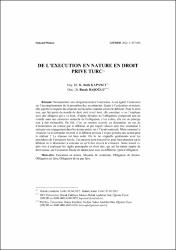Please use this identifier to cite or link to this item:
https://hdl.handle.net/20.500.11779/1801| Title: | De l'exécution en Nature en Droit Privé Turc | Other Titles: | Türk özel hukukunda aynen ifa talebi Specific performance under Turkish private law |
Authors: | Kapancı, Kadir Berk Başoğlu, Başak |
Keywords: | Obligation de faire Obligation de ne pas faire Aynen ifaya yönelik icraî yaptırımlar Mesures de contrainte Yapmama borçları Coercive measures Aynen ifa Obligation to do Exécution en nature Obligation de donner Specific performance Obligation not to do Verme borçları Obligation to give Yapma borçları |
Publisher: | Galatasaray Üniversitesi, Hukuk Fakültesi | Source: | Kapancı, K. B., Başoğlu, B. (Haziran 2022). De l'exécution en nature en droit privé Turc = Türk özel hukukunda aynen ifa talebi = Specific performance under Turkish private law. Galatasaray Üniversitesi Hukuk Fakültesi Dergisi, 21(1), 877-896. | Abstract: | Normalement une obligation tend à l’exécution. A cet égard, l’exécution est l’accomplissement de la prestation due au créancier. Quant à l’exécution en nature, elle signifie la requête du créancier sur la même matière envers le débiteur. Pour le droit turc, qui fait partie du monde de droit civil (civil law), elle constitue, si on l’explique avec une allégorie qui y va bien, « l’épine dorsale » de l’obligation, composant non un remède mais une extension naturelle de l’obligation, c’est à dire, elle est en principe tout à fait réclamable. En fait, c’est un recours accordé au demandeur en cas de d’inexécution du contrat par le débiteur, et par lequel celui-ci peut être condamné à exécuter son engagement dans les termes précis où il l’avait contracté. Mais comment le créancier va le demander en droit si le débiteur persiste à ne pas prendre une action pour le réaliser ? La réponse est bien nette : On le lui « rappelle gentiment » avec les procédures de l’exécution forcée. Ces moyens sont tous prévus pour faire pression sur le débiteur et le déterminer à exécuter ce qu’il doit envers le créancier. Notre travail ci-près vise à expliquer les règles principales en droit turc, qui est lui-même inspiré de droit suisse, sur l’exécution forcée en nature pour tous les différents types d’obligation. Bir borcun olağan sona erme yolu ifadır. Bu bağlamda ifa, alacaklıya karşı borcun yerine getirilmesini ifade eder. Aynen ifa ise, alacaklı tarafından borçluya yöneltilen talebi ifade etmek için kullanılan bir terimdir. Kıta Avrupası (Civil Law) hukuk geleneğini takip eden Türk Hukukunda, aynen ifa borcun bel kemiğini teşkil eder, açılacak olursa aynen ifaya yönelik olan talep borcun (diğer yönden alacağın) doğal bir uzantısıdır, dolayısıyla kural borcun aynen ifasıdır. Aynen ifa talebi, alacak hakkının sahibi borcunu yerine getiremeyen borçlunun bu uğurda harekete geçmesini ve borcu yerine getirilmesini sağlamaktadır. Peki, alacaklı hukuken talebini boşa çeviren borçlu karşısında ne yapabilir, nasıl hareket edebilir ? Cevap bellidir, eğer borçlu talebi boşa döndürürse bu kez ona aynen ifaya yönelik yaptırımlar diziniyle « nazikçe bir hatırlatmada » bulunulacaktır. Bu yaptırımlar, alacaklının borçlu üzerinde baskı meydana getirmek üzere tasarlanmış özel hukuki imkânlardır. İşbu aşağıdaki çalışmamız, İsviçre Hukuku’ndan ilham alan Türk Hukuku’ndaki farklı borç türleri özelindeki aynen ifa talebini ve bu talebin gerektiğinde cebri olarak (zorla) yerine getirilmesi için hukuken sağlanan imkânları ayrıntılarıyla ele almayı amaçlamaktadır. Usually, an obligation tends to be performed. At that regard execution is the fulfillment of the obligation owed to the creditor. As for the performance in kind, or in more technical terms specific performance, it means the request of the creditor with regard the exact subject matter of the obligation from the debtor. For Turkish law, which belongs to the legal tradition of civil law, it constitutes "the backbone" of the obligation, constituting not a remedy but a natural extension of the obligation, that is to say, it is in principle entirely claimable. In fact, it is a tool provided to the creditor in case of non-performance of the obligation by the debtor, and by which the latter is ordered to perform his duty in the very terms that he had agreed upon. But how will the creditor claim it in law, if the debtor persists in not taking an action? The solution is crystal clear: When the debtor ignores it, it is “kindly reminded", with compulsory execution procedures. These means are all intended to create a pressure on the debtor to make him/her perform what he is actually owing to the creditor. Our work in below aims to explain the main rules in Turkish private law, which is itself inspired by Swiss law, on specific performance for all different types of obligation. |
URI: | https://hdl.handle.net/20.500.11779/1801 | ISSN: | 1303-6556 |
| Appears in Collections: | Hukuk Fakültesi Koleksiyonu |
Files in This Item:
| File | Description | Size | Format | |
|---|---|---|---|---|
| kapanci - basoglu - de l execution en nature en droit prive turc - gsuhfd 2022-1.pdf | Full Text - Article | 2.13 MB | Adobe PDF |  View/Open |
CORE Recommender
Page view(s)
34
checked on Jan 27, 2025
Download(s)
4
checked on Jan 27, 2025
Google ScholarTM
Check
Items in GCRIS Repository are protected by copyright, with all rights reserved, unless otherwise indicated.